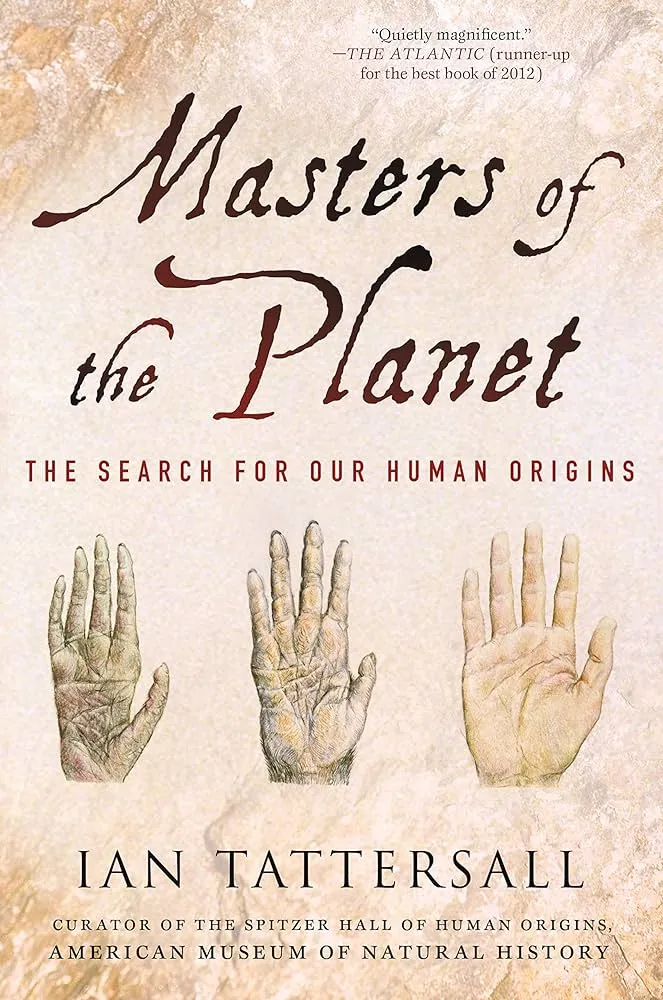by Nat Winn
I’ve been reading Masters of the Planet: The Search For Our Human Origins by Ian Tattersall and I find myself enlightened by the insights about how theory develops when old ways of thinking become exhausted. Tatersall is a leading paleoanthropologist and a curator of the Hall of Origins at the American Museum of Natural History.
Tatersall writes of the bushiness of human evolution. He is critical of the many years that scholars of human evolution looked at the homo sapiens having emerged from a single continuous line of hominid progenitors. What we know now is that there was much more diversity in the evolution from bipedal apes to the single homo species that exists today.
For most of the time that bipedal apes existed there were multiple species of such apes and there were also multiple species of the genus homo for most of the time that homo sapiens existed on the planet. In other words, it was not a given that there would only be one homo species and in fact it is very rare to have only only one species in a genus of mammals. The development of human evolution was not a linear journey from primitiveness to perfection. It was much bushier involving many pathways, most leading to dead-ends.
I think Tattersall’s critique of the current that sees a linear progression from the primitive to the perfect holds important lessons for communist theory and similar notions within our movement.

Teleology and inevitablism in thinking about civilization
There was a similar conception around the development of civilization. The argument went that civilization developed from the simple to the complex. From hunter gatherer societies emerged the development of agriculture and from that great civilizations emerged and continued to develop in a gradual march from primitive to “civilized.”
But, but … for most of human history there was little sign of inherent directionality.
Homo erectus used the same technology (and probably social forms) for a million years with little innovation. Modern humans (for the vast majority of our existence) were scattered bands of simple hunter gatherers with relatively stable forms of existence. (Numbering only in the tens of thousands for period of time — we were literally an endangered species.)
About 10,000 years ago agriculture and domestication of animals caused a great leap in human society (the neolithic revolution). It was a big change.
But that leap probably did not imply or demonstrate a directionality to human society. Yes it happened. But it was not necessarily destined to happen, or inevitable. And class society would not have developed if it had not happened. In other words, the development of class society was not inevitable in the nature of humans (or the nature of the material world).
Peru’s Gonzalo (Abimael Guzman, leader of the Communist Party of Peru – Shining Path) was famous for giving a one day lecture in the early days (before launching their revolutionary war) where he starts with the lecture with the big bang that starts our immediate universe and ends with the world communist revolution — and implies that humans are the universe becoming conscious of itself, and that the contradictions of matter led us here, in a way that is determined and inevitable.
Matter gives rise to life, life gives rise to conscious life, conscious life gives rise to humans, human society gives rise to classes, class struggle gives rise to communism.
Well, that may be how things happened. But there was very likely, no reason that things were determined to happen this way. And each of those leaps are highly contingent, and could have gone some other way.
Human history has given rise to many “civilizations” — the Mayans, the Assyrians, the Malian empire, the Indus valley, the Yellow River civilizations, Egyptian Nile civilization, and so on. Dozens of them. On the basis of agriculture, classes and early cities emerged.
The majority of those “civilizations” rose and fell. They did not give rise to some “next” level of class society. They emerged from the plains and jungles — prospered for a while — and then melted back into the plains and jungles. Is there some directionality to that? Probably not.
Some contradictions of early “civilizations” lead toward new forms of class society such as slavery or feudalism. Some contradictions emerging from those “early civilizations” lead back to scattered peasant agriculture and hunter gatherer life.
There were (even then) “different roads” — posed by objective conditions, in ways that varied greatly from valley to valley — and there was no underlying “directionality” that tended to push them “up” from where they were.
If there is a general direction (in this huge sweep of thousands of years) it appears to be an overall and general development of the productive forces. This is especially intense after the beginnings of regional and then world market emergence. Once knowledge and technique accumulate and is shared, there is an escalation in this, and the beginnings of a world culture. And with capitalism, the accumulation of productive forces is rocket-like (exponential) … especially over the last 500 years. Was that the result of some “directionality” to human society, or just “what happened”? Could something else have happened? I believe that it was not inevitable, and that something else could have happened.
And that it is philosophically dangerous to look at what DID happen, and assume it HAD TO HAPPEN.
So, there IS directionality in the way human society has operated in the last short period (the last three thousand years, and especially the last 500 years) — in the sense that there is a clear growth in productive forces and technique. That is most likely a tendency in the operating of the particular contradictions that emerged, not something inherent in human society.
Inevitabilism in the communist movement.
Thinking about Tatersall’s book and civilization”s development led me to think about certain notions within our inherited communism. Two things jumped immediately into mind. One was the notion of the general crisis theory from the 1930s which is unfortunately still a notion held by some communists today. The other is the rather teleological notion of MLM itself. Let me explain.
The essence of the theory of a “General Crisis” of capitalism was promoted by the Comintern during the Great Depression. The argument went that capitalism no longer had the ability to change (or grant “reforms”) and so every desperate struggle for survival had now become inherently revolutionary. Thus any strategy of fighting for reforms was now ridiculous, inherently sterile and ultimately counterrevolutionary.
Adherents to the General Crisis Theory said that monopoly capitalism was tending toward fascism and that capitalists were laying down their banner of bourgeois democracy. It was asserted that the social-democrats of Europe had literally become social-fascists and were (because of the crisis and the logic of bourgeois politics) the twin of the actual fascists.
However, it is a flawed way of thinking to assume that the “ground has been cut out from under” reformism in some absolute way. Capitalism has proven capable of co-opting people and granting concessions, even when under great crisis.
Let’s look at what happened. Specifically there was FDR’s New Deal. Even under the thumb of fascism, conditions can improve for people, and there have been co-optive mechanisms for drawing people to support fascist regimes. In other words, fascist regimes have never been simply open terrorism by the state — They have always had more complex mechanisms and political dynamics.
It is wrong to assume that the people will “flop over on your plate” simply because of the objective conditions. The assumption that reformist politics will inevitably expose itself as counterrevolutionary will quickly lead to frustration and embarrassment by real-world politics and economics. It will lead you to (specifically) underestimate the real need for political work including exposure, analysis, organization, organizing and leading struggle.
What about Marxism-Leninism-Maoism?
Above I state there is a teleological current in the very notion of MLM. By this I mean that by formulating a conception that communist theory and political practice have proceeded in a linear fashion from Marx through Lenin and then through Mao (a pattern of presumed linear progression) communist repeat the mistakes made by scientists who sought to find in the development of human evolution and civilization’s advance a linear progression from primitiveness to perfection. I don’t presume to argue that we would refer to Marx’s work as primitive, however the logic remains, a teleological logic that communist theory proceeded progressively in one direct line.
I think this way of thinking goes against the way that science actually works. Just like human evolution, I think that communist theory and practice has bushiness to it and has not descended down through history in some direct line. I think there have been several branches or roads that communist thought has taken over the 170 years or so since Marx and Engels wrote the communist manifesto.
Many of those roads were dead ends. They failed to pan out. However, if we continue to learn from other thinkers (Stephen Jay Gould comes to mind), then we understand that we can learn correct ideas even from theories that turn out to be false. In fact Gould taught us that we can incorporate what is correct from false theories into theories that turn out to be more accurate. If we view communist theory as a linear progression from Marx through Lenin to Mao, then we run the risk of tossing out what can be learned from other branches of communist thought.
And that’s not all. Scientific practice is not a closed system. It is an open one. Scientific theories in specific fields incorporate insights across fields and from other areas of intellectual thought. The Revolutionary Communist Party developed its own critique of inevitablism from reading the work of scientist Stephen Jay Gould. The book America in Decline borrowed concepts from the communist philosopher Louis Althusser. And this is as it should be. Our communist theory should not be immune from the insights of other non-communist thinkers in the arts and sciences.
I would call myself a Maoist because I believe that the most advanced stage that communist theory and practice to yet emerge came from the experience of the Chinese revolution and particularly the GPCR. I think there are key lessons from the GPCR and from Maoist thought that we must carry forward into the next wave of communist revolutions. But I think the formulation of MLM was probably wrong-headed from the beginning because of its teleological presumptions. I also believe that the revolutions we make will by necessity take our theory and practice beyond Maoism itself.
Wrapping up
Going back and reading Tattersall and also reading about Gould and Althusser has helped me to clarify my thinking about how science works and what that means for how we approach communist theory. Against notions of inevitablism, teleology, and theoretical isolationsim – communist theory must embrace the role of contingency and accident in the development of natural and social processes and must be an open-system, ready to incorporate insights from different areas of thought into its own body of thinking. If it fails to do this it will remain stuck in old ways of thinking and fail to be a living theory and practice that can answer the challenges of new developments in what humans discover about the world around us. We don’t want to be left behind.


This piece has the kind of depth that makes it impossible to rush through. I found myself lingering over each sentence, appreciating not just the content but the care with which it was crafted. It’s the kind of writing that stays with you, makes you think, and makes you feel all at once.